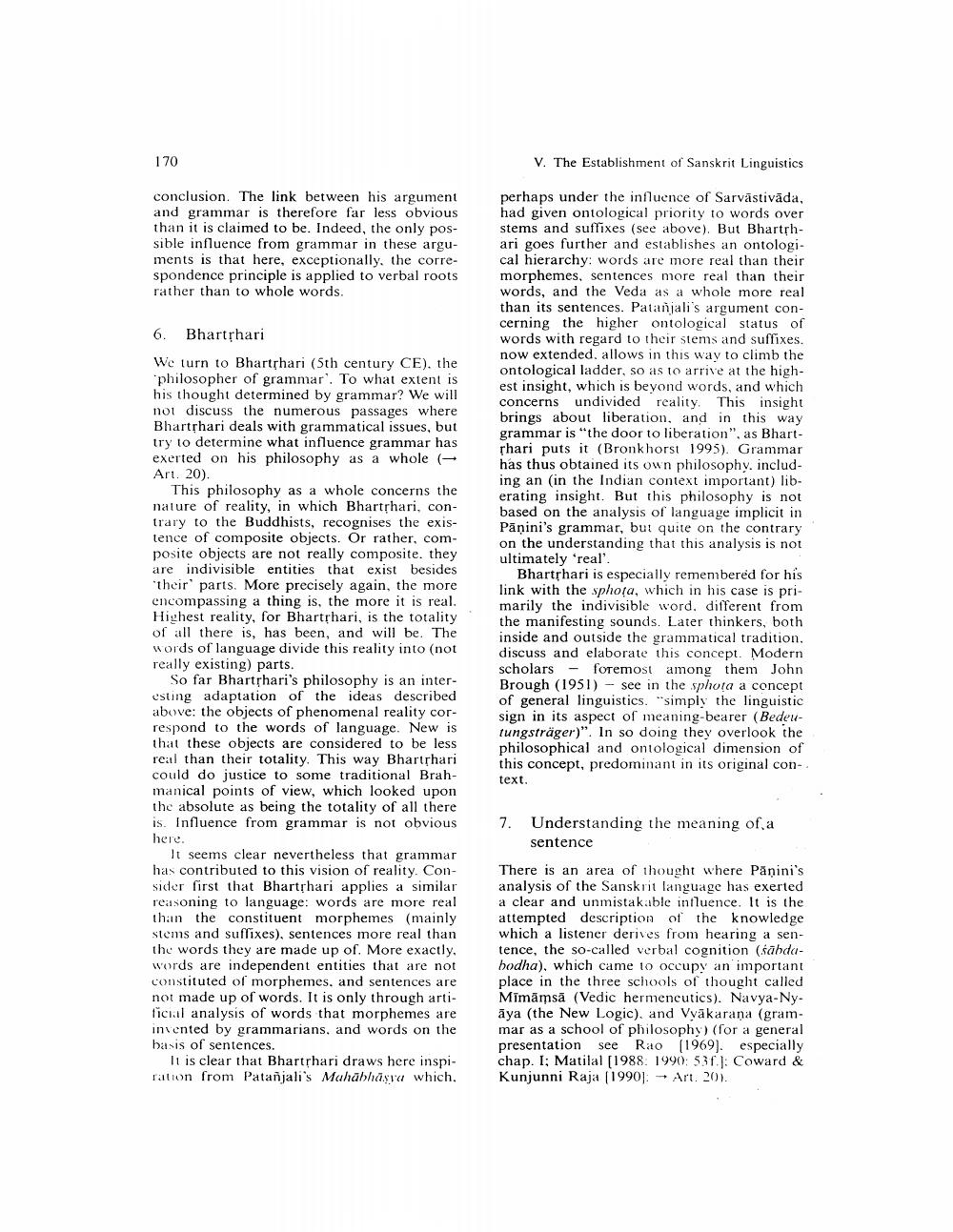Book Title: Relationship Between Linguistics And Other Sciences In India Author(s): Johannes Bronkhorst Publisher: Johannes Bronkhorst View full book textPage 5
________________ 170 V. The Establishment of Sanskrit Linguistics conclusion. The link between his argument and grammar is therefore far less obvious than it is claimed to be. Indeed, the only possible influence from grammar in these arguments is that here, exceptionally, the correspondence principle is applied to verbal roots rather than to whole words. 6. Bhartshari We turn to Bharthari (5th century CE), the philosopher of grammar'. To what extent is his thought determined by grammar? We will noi discuss the numerous passages where Bharthari deals with grammatical issues, but try to determine what influence grammar has exerted on his philosophy as a whole Ari. 20). This philosophy as a whole concerns the nalure of reality, in which Bhartrhari, contrary to the Buddhists, recognises the existence of composite objects. Or rather, composite objects are not really composite, they are indivisible entities that exist besides 'their parts. More precisely again, the more encompassing a thing is, the more it is real. Highest reality, for Bhartrhari, is the totality of all there is, has been, and will be. The words of language divide this reality into (not really existing) parts. So far Bhartshari's philosophy is an interosung adaptation of the ideas described above: the objects of phenomenal reality correspond to the words of language. New is that these objects are considered to be less real than their totality. This way Bharthari could do justice to some traditional Brahmanical points of view, which looked upon the absolute as being the totality of all there is. Influence from grammar is not obvious here. It seems clear nevertheless that grammar has contributed to this vision of reality. Consider first that Bhartshari applies a similar reasoning to language: words are more real than the constituent morphemes (mainly stems and suffixes), sentences more real than the words they are made up of. More exactly, words are independent entities that are not constituted of morphemes, and sentences are not made up of words. It is only through artificial analysis of words that morphemes are invented by grammarians, and words on the basis of sentences. Tu is clear that Bhartrhari draws here inspiration from Patanjali's Mahābhāstu which, perhaps under the influence of Sarvāstivāda, had given ontological priority to words over stems and suffixes (see above). But Bharthari goes further and establishes an ontological hierarchy: words are more real than their morphemes, sentences more real than their words, and the Veda as a whole more real than its sentences. Patanjali's argument concerning the higher ontological status of words with regard to their stems and suffixes. now extended, allows in this way to climb the ontological ladder, so as to arrive at the highest insight, which is beyond words, and which concerns undivided reality. This insight brings about liberation, and in this way grammar is the door to liberation". as Bhartshari puts it (Bronkhorst 1995). Grammar has thus obtained its own philosophy, including an in the Indian context important) liberating insight. But this philosophy is not based on the analysis of language implicit in Pāṇini's grammar, but quite on the contrary on the understanding that this analysis is not ultimately 'real'. Bharthari is especially remembered for his link with the sphota, which in his case is primarily the indivisible word, different from the manifesting sounds. Later thinkers, both inside and outside the grammatical tradition, discuss and elaborate this concept. Modern scholars - foremost among them John Brough (1951) - see in the sphora a concept of general linguistics. "simply the linguistic sign in its aspect of meaning-bearer (Bedeutungsträger)". In so doing they overlook the philosophical and ontological dimension of this concept, predominant in its original context. 7. Understanding the meaning of a sentence There is an area of thought where Panini's analysis of the Sanskrit language has exerted a clear and unmistakable intluence. It is the attempted description of the knowledge which a listener derives from hearing a sentence, the so-called verbal cognition (sābdabodha), which came to occupy an important place in the three schools of thought called Mīmāmsā (Vedic hermeneutics). Navya-Nyāya (the New Logic). and Vvākarana (grammar as a school of philosophy) (for a general presentation see Rao (1969). especially chap. I; Matilal [1988 1990: 537.): Coward & Kunjunni Raja (1990): - Art. 20).Page Navigation
1 ... 3 4 5 6 7 8
